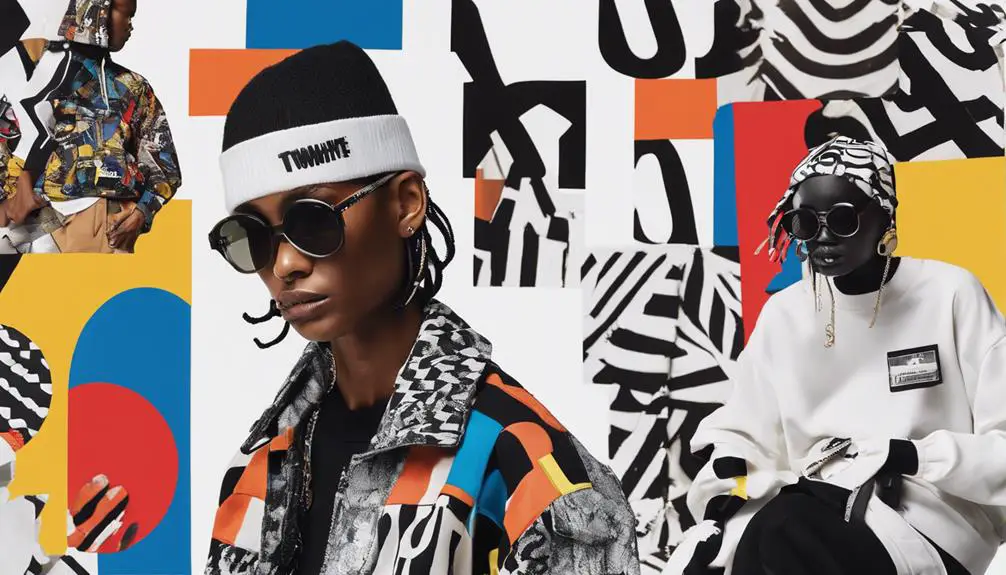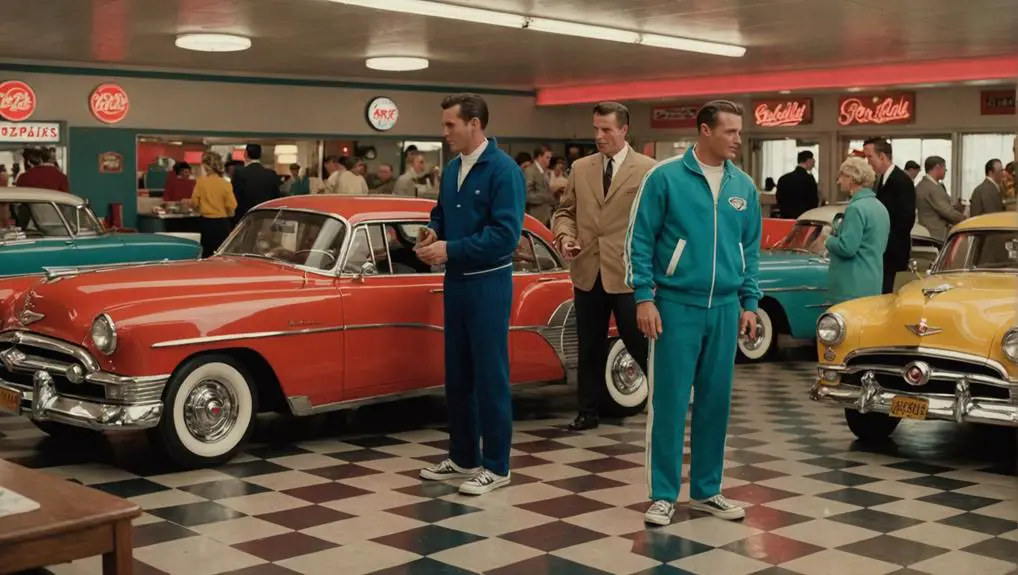In 2013, Virgil Abloh founded Off-White in Milan, Italy, after pivoting from his earlier project, Pyrex Vision. He aimed to create a brand that blended luxury with street culture, setting Off-White apart in the fashion world. The brand made waves with its first womenswear line at Paris Fashion Week in 2014. Known for its bold graphics and iconic designs—like zip ties and quotation marks—Off-White sparked conversations about art and culture in fashion. Its collaborations with Nike and IKEA further pushed boundaries, making a significant mark on the industry. There's much more to explore about its journey and impact!
Origins of Off-White

Off-White was consistently pushing the boundaries of fashion when it was founded in 2013 by Virgil Abloh in Milan, Italy. The brand emerged after Abloh faced legal challenges with his initial project, Pyrex Vision, leading him to create Off-White as a fresh take on the grey area in fashion. This new identity quickly caught the attention of the fashion world, thanks to its innovative design and unique approach that blended luxury with streetwear.
In 2014, Off-White made its mark at Paris Fashion Week by debuting its first womenswear line, showcasing signature elements like diagonal stripes and quotation marks that have become synonymous with the brand. These distinctive designs not only resonated with fashion enthusiasts but also set new trends in the industry. Abloh's vision helped redefine how luxury and streetwear could coexist, attracting a diverse audience.
The brand's influence continued to grow, and in 2019, Farfetch acquired Off-White's parent company, New Guards Group, for a whopping $675 million, signaling its importance in the fashion landscape.
Two years later, LVMH, a giant in the luxury market, purchased a 60% stake in Off-White, further solidifying its position as a leading brand.
With its unique design philosophy and strong market presence, Off-White has transformed the way we think about fashion, blending high-end aesthetics with street culture, and paving the way for future designers.
Evolution From Pyrex Vision
The evolution from Pyrex Vision to Off-White marked a pivotal moment in Virgil Abloh's career and the fashion landscape. Initially founded in 2012, Pyrex Vision aimed to transform deadstock clothing into high-priced streetwear, stirring significant controversy. While the brand showcased bold graphics and unique designs, it faced legal hurdles due to trademark issues, leading Abloh to pivot to a new brand concept in 2013.
This shift also mirrored the evolution seen in brands like Adidas, which adapted their aesthetics and branding over the decades, establishing a strong cultural impact in the fashion world through vintage logo significance.
Transitioning to Off-White allowed Abloh to explore the grey area between black and white, symbolizing the complexities of contemporary fashion. This evolution wasn't just a name change; it represented a shift toward high-end streetwear that combined luxury fashion elements with street culture. Off-White's debut collection at Paris Fashion Week in 2014 solidified its status as a leader in the luxury streetwear market.
Here are some key aspects of this evolution:
- Rebranding: Pyrex Vision to Off-White, redefining the brand concept.
- Aesthetic Shift: A more refined look that resonated with diverse audiences.
- Creative Vision: Expanding Abloh's approach to fashion.
- Collaborations: Partnering with major brands to enhance visibility.
- Industry Impact: Setting trends in high-end streetwear and contemporary fashion.
Through this transformation, Virgil Abloh not only carved out a niche for Off-White but also influenced the entire fashion industry, proving that streetwear could coexist with luxury. This evolution set the stage for Off-White's continued success and relevance in today's fashion world.
Signature Aesthetic and Design

Virgil Abloh's distinctive aesthetic for Off-White blends bold graphic elements with a playful irony that challenges traditional fashion norms. As the designer behind the brand, Abloh has created a signature aesthetic that captivates audiences with its mix of high-fashion craftsmanship and streetwear influences.
You'll notice bold graphic elements like diagonal stripes and quotation marks throughout his work, which not only redefine luxury but also make statements about consumer culture.
One of the exciting aspects of Off-White is its unique packaging, often featuring signature zip ties that elevate even the unboxing experience into a memorable event. This attention to detail underscores the brand's commitment to transforming everyday objects into luxury items.
Take the Binder Clip bag or the Jitney bag, for instance; these pieces cleverly reinterpret mundane items, turning them into must-have fashion statements.
Abloh's designs often engage with cultural commentary, addressing contemporary issues and resonating with a younger audience. He makes you think about societal norms while still enjoying the playful nature of fashion.
This approach keeps Off-White relevant and thought-provoking in a fast-paced industry.
In essence, Off-White isn't just about clothes; it's about creating a dialogue through fashion. With each collection, you're invited to explore the intersection of art, culture, and everyday life, all while enjoying the unique flair that only Virgil Abloh can provide.
Key Collaborations and Partnerships
Collaborations have played a significant role in expanding Off-White's influence beyond traditional fashion boundaries. By partnering with various brands across different industries, you see how Off-White blends luxury streetwear with unique cultural references.
Each collaboration showcases the brand's innovative spirit, creating products that resonate with diverse audiences.
Here are some notable partnerships:
- Nike: In 2017, Off-White transformed ten iconic sneaker silhouettes into the "The Ten" collection, creating limited-edition designs that are now highly sought after in the resale market.
- IKEA: In 2018, the "Markerad" collection merged art and functionality, offering contemporary furniture that appeals to millennials.
- Jimmy Choo: Off-White's collaboration with Jimmy Choo in 2018 drew inspiration from Lady Diana, proving the brand's knack for blending high fashion with cultural references.
- Rimowa: The limited edition transparent suitcase released in 2018 for $1,700 highlighted Off-White's unique take on luxury travel accessories.
- New York Liberty: Announced in 2024, a multi-year partnership with the WNBA team solidified Off-White's presence in sports and community engagement.
These collaborations not only enhance Off-White's portfolio but also push the boundaries of what fashion can represent.
Each partnership emphasizes creativity and innovation, allowing you to appreciate the brand's evolving narrative while enjoying exclusive, limited-edition products.
Impact on Fashion Industry

Revolutionizing the luxury streetwear landscape, Off-White has redefined contemporary fashion aesthetics and influenced a new generation of designers. Founded by Virgil Abloh in 2013, the brand quickly emerged as a leader in luxury streetwear, merging high fashion with youth culture. You can see how its unique design elements, like diagonal stripes and quotation marks, have become iconic symbols that many designers aspire to replicate.
This influence parallels Nike's impact on sneaker culture, where innovative designs and strategic endorsements have shaped market trends and consumer behavior, highlighting the importance of athlete endorsements in brand visibility.
One of Off-White's most significant impacts came from its collaboration with Nike in "The Ten." This partnership didn't just elevate sneaker culture; it transformed the resale market, with some shoes selling for a staggering 450% markup. This shift challenged traditional views on luxury and accessibility in fashion, making it clear that streetwear was here to stay.
Moreover, Off-White's various collaborations with brands like IKEA and Levi's broadened the scope of what luxury means today, pushing the boundaries beyond clothing to incorporate lifestyle products. This innovative approach has compelled established high-end fashion houses to adapt, incorporating streetwear influences into their collections, thereby reshaping the entire industry.
Through its bold design aesthetic and cultural relevance, Off-White hasn't only influenced fashion trends but has also created a new dialogue around luxury and youth culture. As you explore the impact of Virgil Abloh's vision, it's evident that Off-White has left an indelible mark on the fashion industry, inspiring both consumers and creators alike.




